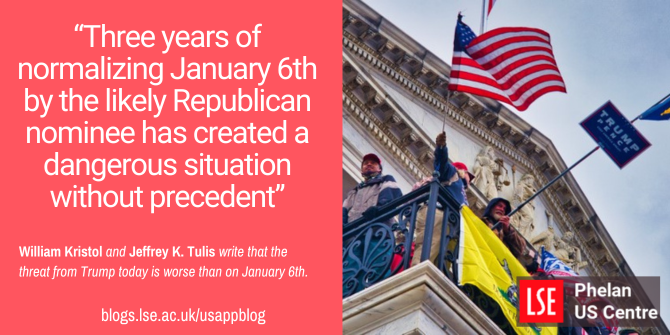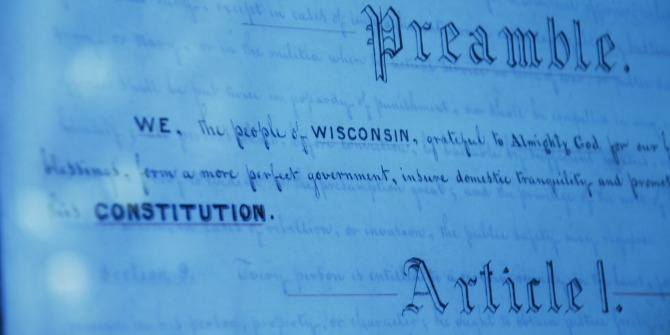
 As the 2024 US presidential primaries get underway, it looks increasingly likely that former president Donald Trump will be the Republican Party’s nominee. William Kristol and Jeffrey K. Tulis write on the continuing lessons of the US capitol insurrection of January 6th, 2021, which saw Trump’s supporters attempt to usurp the transfer of power. They write that the Republicans who stood up to Trump then are gone now, and that Trump’s re-election could critically wound US constitutional democracy.
As the 2024 US presidential primaries get underway, it looks increasingly likely that former president Donald Trump will be the Republican Party’s nominee. William Kristol and Jeffrey K. Tulis write on the continuing lessons of the US capitol insurrection of January 6th, 2021, which saw Trump’s supporters attempt to usurp the transfer of power. They write that the Republicans who stood up to Trump then are gone now, and that Trump’s re-election could critically wound US constitutional democracy.
Our democracy survived January 6, 2021.
Three years ago, the United States came closer to a presidential usurpation than at any previous time in American history. Never before had a sitting president attempted to retain power after losing an election. Never before had a sitting president called on a mob to attack the Capitol.
Still: on that day, Congress was not prevented from carrying out its duties. The transfer of executive power was completed as scheduled on January 20, 2021, despite the violence and insurrection. Donald Trump left the White House. The guardrails held.
So, some confidence might seem in order: One might believe that, if we could survive the challenge of January 6th, when we were on the precipice of imminent democratic failure, surely the challenges to constitutional democracy that we face today will be easier to overcome.
The continuing lessons of January 6th, 2021
We wish this were so. But the fact is that the United States is closer to constitutional failure today than it was three years ago.
Our political future is so precarious today partly because of the ways we have misunderstood the significance of January 6th.
The then Vice-President Mike Pence, and Speaker of the House, Nancy Pelosi, and others in Congress came dangerously close to being killed by a mob. The vote to certify the results of the 2020 presidential election came very close to being postponed. January 6th was an awful and momentous day.
But while more bloodshed might have stalled the certification of the election, it would not have ended it. Trump’s insurrection would have failed even if it had done more immediate damage.
Recall the shock of most of the political establishment and most citizens during the siege of the Capitol and for several days after. Democrats and Republicans alike were horrified. Democrats and Republicans alike were quick to hold President Trump responsible for it.
Even the shapeshifting South Carolina Senator, Lindsey Graham, remarked, “From my point of view, he’s been a consequential president. But today . . . all I can say is count me out. Enough is enough.” Indeed Graham reportedly called the White House counsel to warn that if Trump did not quickly do more to tamp down the violence, “we’ll be asking you for the Twenty-fifth Amendment”, to remove Trump from power.

“Capitol Breach 5” (CC BY-NC 2.0) by Bsivad
For a moment, even Kevin McCarthy appeared to have acquired enough of a spine to admit that “the president bears responsibility for Wednesday’s attack on Congress by mob rioters” and that Trump “should have immediately denounced the mob when he saw what was unfolding.”
If the violence had been even worse than it was, if the threat to democracy had been even more palpable, presumably the common reaction would have been even stronger. Even as it was, the nation was—however briefly—nearly unified in denouncing what happened. Trump was impeached in the House in a vote more bipartisan than any previous impeachment. A majority of senators voted for conviction. And Senator Mitch McConnell (R-KY) vehemently denounced Trump as he (disastrously) justified his vote not to convict Trump in February 2021.
But how do things stand today? Worse.
Complacency and Trump’s potential White House return
We now know much more about Donald Trump’s post-2020-election plans and actions than we did in the immediate aftermath of the attack on the Capitol. Yet Republican leaders and purveyors of GOP “news” no longer criticize January 6th—and much of the Republican base talks about it as if it were no big deal (calling it “overblown”), or as if it were a liberal conspiracy (a “false-flag operation”), or as if the members of the violent mob deserve our praise (calling them, rather than the police who fought them, the “J6 heroes”).
Where once there was widespread alarm and revulsion among Republicans about January 6th, today there is acquiescence or, at best, complacency. This brings home the severity of the threat to democracy posed now by the prospect of the re-election of Donald Trump.
What was once unthinkable and outrageous has become normalized over the last three years. Trump has responded to his political and legal losses by doubling down on the behavior and rhetoric for which he was denounced. His behavior was anticipated by the House managers in Trump’s first impeachment trial when they warned that if he were not convicted, he would feel emboldened to ignore or subvert the Constitution again. And he has been laying the groundwork for doing that for the last three years.
Greater peril to democracy in 2024 than 2021
Since his second impeachment, Donald Trump has attacked every person and every institution involved in uncovering and reporting his misbehavior.
Most remarkably, Trump has embraced the notion that, if elected again, he will govern as a “dictator.” We have a detailed and very public record of how he plans to do that—including indications of the individuals he plans to appoint to key roles in his administration, a Heritage Foundation report on how to dismantle much of the federal government unilaterally without legislation from Congress, plans to use the Department of Justice to go after his critics and his political rivals, and plans to use the armed forces and larger national security apparatus for his domestic political purposes.
And Trump has the Republican party and the conservative movement in lockstep behind him. This is not one man, ostracized and shouting in the wilderness. It is not even former President Richard Nixon giving bitter interviews from exile, no longer a factor in American politics.
The leader of the January 6th insurrection is all but certain to be the presidential nominee of one of our two major parties. And polls suggest he has a very real chance to win the general election.
This is why we are in important ways in greater peril in January 2024 than we were in January 2021.
Those who stood up to Trump are gone
Our democracy is more fragile now than it was then. Three years of normalizing January 6th by the likely Republican nominee has created a dangerous situation without precedent. It’s true that the Republican Party went along with President Donald Trump for four long years—and caused great damage in doing so.
But critically important Republicans broke with him in the weeks after the 2020 election and on January 6th. Attorney General Bill Barr refused to back Trump’s election lies and resigned. Other top Trump appointees in the Justice Department threatened to quit if an unqualified Trump stooge were installed in Barr’s place. Lawyers in the White House counsel’s office tried to stymie Trump’s “elite strike force” of election-overthrowing lawyers. And most importantly, at the critical moment on January 6th, Vice President Mike Pence refused to bend to Trump’s will. Then, afterwards, many Republicans were willing to blame Trump for January 6th.
But those who stood up to him are now gone. The Republicans who broke with Trump have either been marginalized or returned to singing his praises. All but two of the representatives who voted for his impeachment are out of office. If he were returned to the White House, he would have only sycophants around him and none of the so-called “adults in the room” who, however ineffectually, tried in his first term to check his worse impulses.
Trump’s re-election could critically wound US democracy
The pro-insurrectionists, joined by anti-anti-insurrectionists, are in control of the Republican party. And the forces marshaled behind Donald Trump to subvert and overthrow important features of our constitutional democracy are stronger than they were in January 2021—or for that matter in January 2017.
Whether or not one thinks Trump’s aspirations—and those of many of his key associates, like former Trump chief strategist, Steve Bannon—are rightly called fascistic (we do), and whether or not one thinks Trump’s authoritarian plans could be realizable if he came to power (we do), Americans need to recognize, at a minimum, that the re-election of Donald Trump would make presidential leadership arbitrary and willful, would tilt the federal government radically toward lawlessness, and would seriously, perhaps critically, wound our constitutional democracy.
January 6th, it turns out, was a rehearsal for the true upheaval, the far deeper insurrection, that Trump now intends to lead if re-elected. January 6th was prologue. The election year of 2024 will be the decisive drama on the main stage, and its outcome is very much in doubt.
A version of this article appeared originally at The Bulwark.
Please read our comments policy before commenting.
Note: This article gives the views of the author, and not the position of USAPP – American Politics and Policy, nor the London School of Economics.
Shortened URL for this post: https://bit.ly/4aDHCpn






